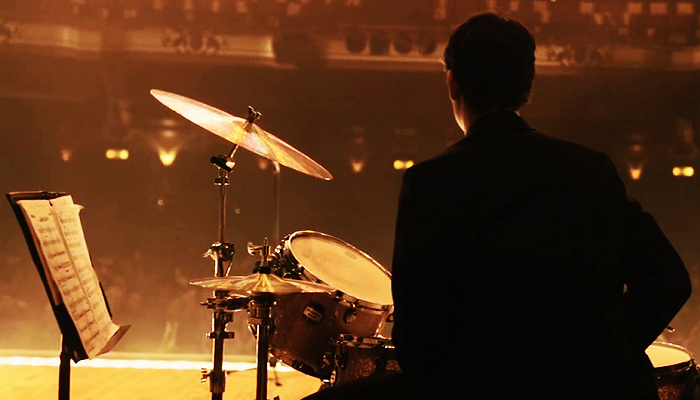Music in film often plays a supporting role, heightening emotion or accentuating moments. Yet in some movies, music goes beyond mere background — it becomes an essential part of the narrative itself. The score and soundtrack shape character, mood, and meaning so profoundly that music feels like another character on screen. Here are ten films where music is far more than sound — it is a central force in storytelling.
Psycho (1960)

Bernard Herrmann’s score for Psycho is a defining element of the film’s enduring impact. Most notably, the piercing string motif in the infamous shower scene has become one of the most iconic sounds in cinematic history. But the score does more than create suspense — it mirrors the fractured psyche of Norman Bates and amplifies the unease throughout. Herrmann’s music intensifies the psychological depth of the film, setting a tone of dread that lingers long after the final frame.
Moonrise Kingdom (2012)

In Moonrise Kingdom, music serves as both emotional compass and narrative glue. Alexandre Desplat’s original score, complemented by classical selections — especially Benjamin Britten’s compositions — and nostalgic pop tracks, gives the film its distinct sense of whimsy and warmth. The music mirrors the innocence, urgency, and emotional sincerity of its young protagonists. Far from ornamental, it helps build the quirky yet heartfelt atmosphere that defines Wes Anderson’s storytelling.
Melancholia (2011)

Lars von Trier’s Melancholia uses music not just as enhancement, but as a profound thematic anchor. Richard Wagner’s Tristan und Isolde prelude recurs with deliberate weight, foreshadowing the film’s apocalyptic narrative while echoing Justine’s inner despair. The sweeping orchestration elevates the visual slow-motion sequences into moments of operatic grandeur. Here, music embodies emotional collapse and cosmic inevitability, transforming silence and stillness into something deeply expressive.
Drive (2011)

The soundtrack of Drive, composed by Cliff Martinez and enriched with synth-driven tracks like Kavinsky’s “Nightcall,” is central to the film’s identity. It provides an emotional undercurrent for the Driver, a largely silent protagonist whose internal world is revealed through music rather than dialogue. The retro-futuristic soundscape conjures a noir-like atmosphere, accentuating the film’s cool detachment and quiet intensity. Music becomes the Driver’s language — moody, restrained, and profoundly human.
Interstellar (2014)

Hans Zimmer’s score for Interstellar is a sweeping, organ-led composition that redefines what science fiction can sound like. The music’s grandeur matches the film’s vast interstellar journey, yet it also draws attention to the intimate human relationships at its core. Zimmer’s use of time, rhythm, and repetition reflects the narrative’s nonlinear structure, often conveying emotion where words fall short. The result is a score that binds the personal to the cosmic in striking harmony.
In the Mood for Love (2000)

Shigeru Umebayashi’s ‘Yumeji’s Theme’ is repeated throughout In the Mood for Love like a quiet refrain, capturing the ache and restraint that define the film’s emotional landscape. Each recurrence of the melody draws out the unspoken yearning between the characters, slowing time and deepening mood. The music communicates the inner turbulence beneath the film’s polished surface, serving as an emotional proxy for feelings too complex to articulate aloud.
Whiplash (2014)

In Whiplash, music is not background — it is the battleground. The film’s explosive jazz performances, especially the drumming sequences, are tightly interwoven with the emotional and psychological stakes. As Andrew strives for greatness under the brutal mentorship of Terence Fletcher, the music escalates with intensity. It symbolizes ambition, obsession, and sacrifice. Every note is earned, every beat carries consequence — music is the pressure and the prize.
Phantom Thread (2017)

Jonny Greenwood’s lush score for Phantom Thread is as refined and controlled as the fashion world it inhabits. With its elegant piano and sweeping strings, the music reveals the emotional undercurrents that simmer beneath the characters’ composed exteriors. It captures not just romance and obsession, but also manipulation and vulnerability. Like the garments Reynolds creates, the music is meticulous — tailored to reveal what lies beneath the surface.
Scott Pilgrim vs. the World (2010)

In Scott Pilgrim vs. the World, music is a core part of the universe, influencing the film’s structure, pacing, and visual style. With a soundtrack steeped in garage rock, punk, and video game aesthetics, each song acts as both emotional driver and narrative device. Bands battle in literal musical duels, and lyrics reflect characters’ internal states. The soundtrack doesn’t just set the scene — it shapes the story with rhythm, irony, and raw energy.
Rocketman (2019)

Rocketman transforms Elton John’s music into a vivid storytelling tool, blending biographical drama with fantasy musical. Songs are reimagined to reflect emotional moments, often defying linear chronology to reveal deeper psychological truths. Rather than placing music around the narrative, the film builds its narrative around the music. Every number advances the emotional arc, turning Elton’s hits into confession, celebration, and catharsis.
[Contributed By Anushka Gaikwad]











